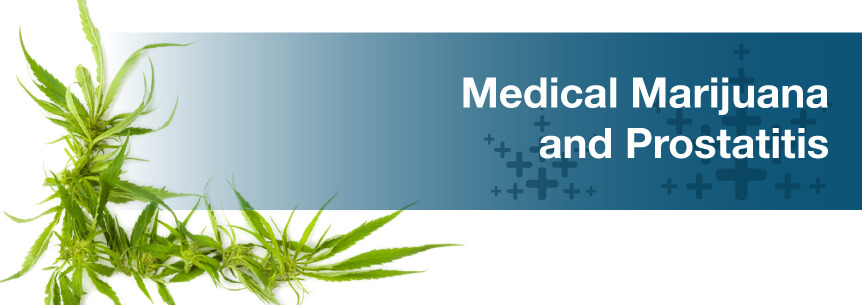
Back in the days, folk healers depended on natural plant compounds long before scientists even explored the idea of synthetic medicines. One plant used in ancient times for ceremonial and medicinal purposes was cannabis sativa. Marijuana has many advocates for its ability to eliminate pain, treat glaucoma, fight chemo-induced nausea and treat a whole range of other symptoms. Some patients even use medical marijuana for prostatitis treatment.
Prostatitis pain can be so unbearable it disrupts both your professional and personal life. Many people turn to OTC pain relievers to manage their pain and keep it under control, but it seems these types of medications come with significant side effects — one of them being that they can lower your blood pressure, which can be harmful to anyone if it continues for a long period.
Find A Doctor Find A Dispensary
Marijuana and prostatitis treatment is a pain management therapy that can combat your pain without altering your blood pressure. Along with confirming medical marijuana reduces pain levels in patients suffering from pain, several clinical studies have discovered it does so without the potentially negative side effects of narcotic-based pain medication.
A recent study concluded adding medical marijuana to the daily narcotic pain medications used by sufferers of chronic pain reduced pain levels without increasing the concentration of narcotics in the patients’ blood or further slowing the respiratory system.
Along with the more widely known substance, THC, which is responsible for combating pain, medical marijuana contains Cannabidiol, or CBD, an important component of marijuana which has been shown to have anti-inflammatory properties.
Along with CBD, medical cannabis has been shown to reduce tissue inflammation as a result of the presence of the compound ß-caryophyllene. The two together show great promise in clinical studies as excellent anti-inflammatory drugs not carrying the risk of causing internal damage as do most of the NSAIDs currently used.
Prostate cells, like many tissues, have CB1 and CB2 receptors. Prostate cancer cells, however, contain an excess of them. This prompted the start of Spanish research.
During this research, scientists studied three distinct human prostate cancer cell populations. They grew these cells in the lab and then added a few different cannabinoids — one was a strong CB2 stimulator. Through this study, the scientists found that through cannabinoid-induced CB2 receptor activation, the growth of all three cell types slowed down. Furthermore, the cannabinoids targeting CB2 triggered apoptosis, killing the prostate cancer cells.
Cannabidiol (CBD) is an essential component of cannabis and prostatitis treatment with anti-inflammatory properties. Medical marijuana also contains the compound B-caryophyllene, which reduces inflammation. These substances combined are a natural medication showing promise in clinical studies.
Using medical cannabis for prostatitis may effectively manage:
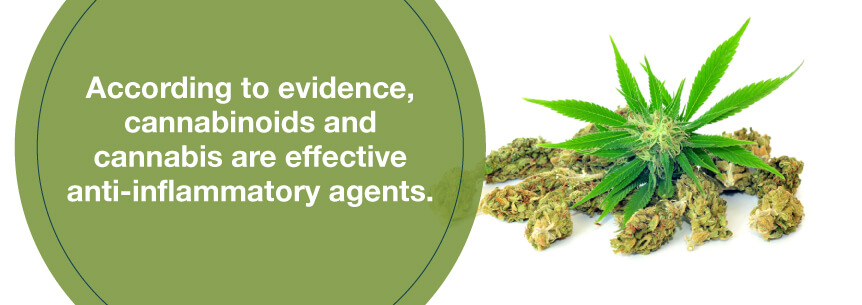
Also, according to evidence, cannabinoids and cannabis are effective anti-inflammatory agents, as well.
Prostatitis can be an extremely painful condition. Along with causing pain during urination, a sufferer may have extreme pain all over the groin area and may experience pain during sexual intercourse. The level of pain experienced by someone suffering from Prostatitis can be debilitating and impact the ability to work and enjoy life.
Although conventional narcotic pain medications can relieve pain, they come with a host of potentially negative side effects. Aside from the risk of addiction, dependence or overdose, narcotic pain medications can also reduce blood pressure and damage internal organs.
In addition, medical marijuana can also be used as an anti-inflammatory medication. Non-steroidal anti-inflammatory drugs, or NSAIDs, are commonly prescribed to reduce inflammation. However, like narcotic pain medications they also carry the risk of serious side-effects including nausea, vomiting and long-term damage to various internal organs.
The biggest problematic symptom with prostatitis is pain. You have:
Cannabis strains good for treating prostatitis-related pain include:
You may also experience flu-like symptoms if you have bacterial prostatitis. Certain substances, like flavonoids, help strengthen your immune system and fight the flu. Flavonoids are found in every plant, including the cannabis plant, and are where marijuana gets its anti-inflammatory properties. When you’re sick with a cold or the flu, it just means your lacking essential flavonoids in your body.
Cannabis fixes this imbalance. The marijuana plant prevents your blood cells from rupturing and increases the Vitamin C supply of your body. Since the herb works as a powerful anti-inflammatory and antioxidant, here are a few strains to try for each effect:
Marijuana for prostatitis provides various pharmacological effects, but these effects depend on the dose and method of delivery. Common delivery methods are smoking, dabbing, vaporizing and oral consumption. You may also make medical weed into salves, lotions, balms and creams for topical administration.
You can smoke cannabis with various apparatuses. Common forms of smoking include the use of:
With edibles, baked goods are the most common, such as cookies, cakes and brownies. Many dispensaries also carry fruit snacks, sugary candy and oil or butter you can add to your own creations.
For some patients, obtaining a medical marijuana card is simple. All it requires is filling out a few forms and making a quick visit to your primary physician. Others may have a more challenging time obtaining their card, especially if their doctor is unwilling to make the recommendation for their own reasons.
The good news is you can find a cannabis-friendly doctor and local dispensary all in one place: at MarijuanaDoctors.com. We thoroughly review and screen all our listings of qualified doctors to ensure they’re knowledgeable, friendly and compliant with state laws. This allows you to choose from a huge list of medical doctors you can trust. To get started, search for a medical marijuana dispensary or get in touch with a doctor today.
Find A Doctor Find A Dispensary
Prostatitis is inflammation and swelling of a man’s prostate gland. This walnut-sized gland is located right below a man’s bladder and produces semen that transports and nourishes sperm. Prostatitis often causes painful and challenging urination, as well as other symptoms of pain in the pelvic, groin or genital area.
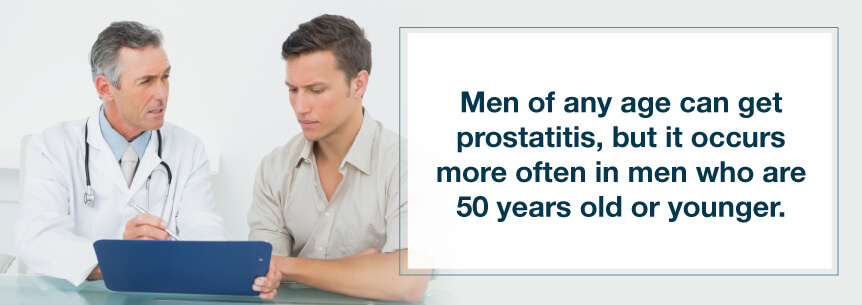
Men of any age can get prostatitis, but it occurs more often in men who are 50 years old or younger. In fact, it’s the most common urinary tract problem in men younger than 50 years old and the third most common in men older than 50.
There are several causes for prostatitis, but in some cases, doctors can’t identify the reason for it. When a bacterial infection causes the condition, doctors typically treat it with antibiotics. The condition accounts for around two million doctor visits a year in the U.S., according to the National Institute of Diabetes and Digestive and Kidney Diseases.
Prostatitis can come on slowly or suddenly depending on the cause. It may even improve rapidly with treatment, or clear up on its own. Some prostatitis types may keep recurring or last for several months — it’s then considered chronic prostatitis.
Chronic prostatitis is the least understood and most common type of prostatitis. It affects up to 15 percent of the American male population and may occur at any age. The Prostate Cancer Foundation reports that around 75 percent of all men seeking medical attention for urological issues have prostatitis symptoms.
Contrary to belief, prostatitis is not prostate cancer — it’s a benign ailment usually curable with antibiotics. In some cases, prostatitis inflammation may raise a man’s prostate-specific antigen (PSA) level, but it doesn’t result in cancer.
Doctors and researchers believe prostate cancer is due to various factors like lifestyle, diet, environmental exposures and genetics. However, there is the idea that continued prostate inflammation may result in prostate cancer development. Researchers are studying this possibility to see if you can prevent prostate cancer by reducing inflammation.
There are four primary forms of prostatitis:
The medicinal value of marijuana has been known by medical practitioners around the world for centuries. In particular, medical marijuana has been used as an analgesic to combat moderate to severe pain by numerous cultures for as far back as we have written records.
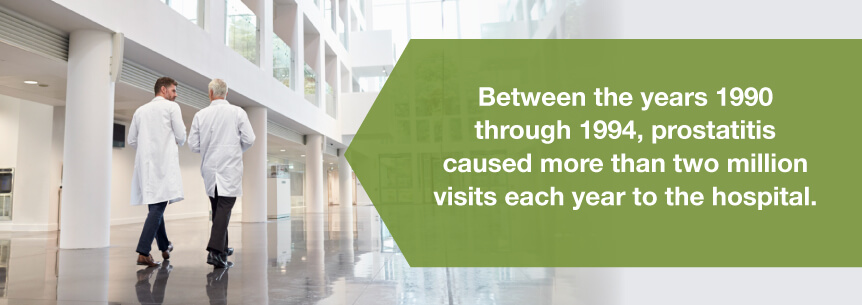
Between the years 1990 through 1994, prostatitis caused more than two million visits each year to the hospital — half were to primary care doctors, and the other half were to urologists.
The symptoms you develop depend on what’s causing your prostatitis, but some examples include:
If you’re experiencing difficulty or painful urination, pelvic pain or painful ejaculation, you should set up an appointment with your physician to have it checked out. When left untreated, some types of prostatitis can cause the infection to get worse or lead to other health issues.
Prostatitis may cause complications, including:
If you’ve been struggling with prostatitis for a while, it can affect your psychological state. Emotions like anxiety, depression and stress are linked to difficult to treat, long-term chronic pain conditions.
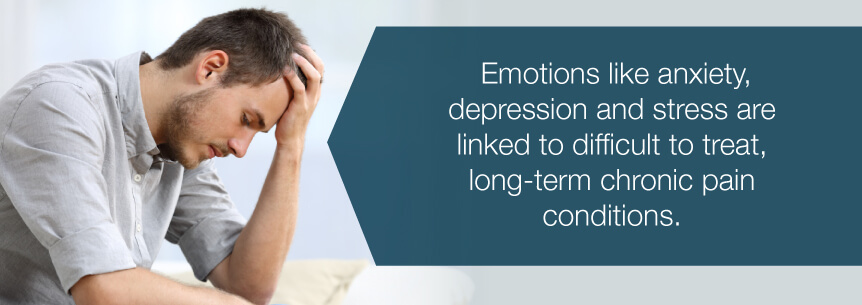
CPPS may be especially difficult to deal with, as it causes embarrassing sexual and urinary symptoms, affects your sex life and causes sexual and pelvic pain. Prostatitis can cause serious problems with your social and intimate relationships, and you may result to withdrawing from your partner and friends to deal with the chronic discomfort and embarrassment. But oftentimes, withdrawing leads to loneliness and negative thoughts.
Your treatment for prostatitis will depend on what type of the condition you have. Here are four common variations of the condition, along with the treatment options for each.
For this type of prostatitis, the doctor will have you take antibiotics for a minimum of two weeks. You might need to stay at the hospital to receive your treatment through an IV. If you find it difficult to urinate, your doctor may use a catheter (tube) to drain out your bladder. With this treatment, physicians can cure these types of acute infections — you may need to take antibiotics for up to four weeks, however, and try different types of medication if one isn’t working.
For this type, you may need antibiotics for a longer period — typically up to 12 weeks. This treatment tends to clear up around three in four of these chronic bacterial prostatitis cases. In some cases, you’ll need antibiotics if the symptoms come back. If your case isn’t reacting to treatment, you may require a long-term, lower dose antibiotics treatment to help alleviate your symptoms.
Bacteria may cause this type of prostatitis, and although the bacteria isn’t always simple to identify, antibiotics can still cure this condition. Because of this, your doctor will likely give you antibiotics whether or not your tests showed bacteria as the cause of your CPPS. They will also determine how long you take these medications. While taking them, if you don’t have an infection, you may begin to feel better quickly since the antibiotics are reducing inflammation. Keep taking all antibiotics prescribed to you regardless.
If you’re diagnosed with asymptomatic inflammatory prostatitis, you may not require treatment.
Common side effects of antibiotics for prostatitis include:
To help you feel better, your doctor may prescribe other types of treatment to supplement your antibiotics. There are a variety of options, such as alpha-blockers to help your muscles relax around the base of your bladder and prostate. Your physician may also recommend you take:
To help ease the pressure, prostatic massages can drain fluid from your prostate ducts while your doctor performs specialized physiotherapy to relax neighboring muscles. Heating pads, hot baths and other relaxation exercises can also help alleviate pain. You may require an inflatable cushion or donut pillow if it’s too painful to sit.
Your doctor might recommend avoiding acidic or spicy foods and fizzy, caffeinated or alcoholic drinks. You may also need to stop certain activities, like biking, if it’s making your pain worse. In rare cases, your doctor may advise surgery on your prostate or urethra. But, this is only if there’s a problem like urethra scar tissue with your body.